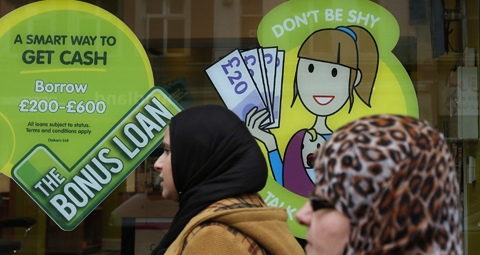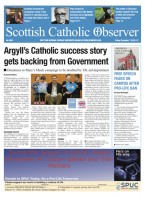December 7 | ![]() 0 COMMENTS
0 COMMENTS ![]() print
print

Why we’re all banking on Faith
As Christians rail against payday lenders, Ross Ahlfeld finds communities are leading the fightback.
It would be no exaggeration to say that the language used by the Archbishop of Canterbury in his recent electrifying speech to the TUC conference spoke directly to the hearts (and also to the collective memory) of Scottish Catholics.
In his blistering assault on debt, Justin Welby singled out the payday lender Wonga. Indeed, it has been suggested that the churches and charities which successfully campaigned for more robust regulation and a cap on payday lending interest rates, are (in part) responsible for the recent collapse of Wonga.
And rightly so, especially since Leviticus speaks of a magnificent year of Jubilee, when there is a release for those enslaved by debts and a redistribution of lands lost to debt. Jubilee is about a glorious debt cancellation, reordered community, and freedom from debt bondage.
A huge problem
Even so, debt still remains a huge problem in our communities, according to Community Money Advice Scotland (CMAS); personal debt is affecting one in six adults in Renfrewshire, Inverclyde and East Renfrewshire.
As such, it is very positive to see the wonderful team from the aforementioned Community Money Advice Scotland out and about in Paisley diocese speaking to parishioners interested in becoming trained debt advisers.
It’s hoped that parishioners will be trained for this vital service to support those affected by debt across the diocese.
Charity
CMAS is a much-needed Christian charity supporting churches to run their own advice centres tackling this problem.
Local volunteers are trained to provide free face-to-face advice for anyone struggling financially with rising rents, unpaid bills or benefit sanctions.
So sure, we may well be glad to see the long overdue decline of payday lending and the end of other lenders such as Wonga.
Yet, we also remain fully aware of the ongoing misery for families who find themselves in desperate need of cash.
Sheer desperation often forces individuals to take out instant loans at exorbitant rates of interest. It’s certainly no fun being down to your last tenner, contemplating a payday loan in the full knowledge of the implications.
In all honesty, it was only the access to microcredit via my credit union membership which got me through some difficult times.
As such, it is my sincerest hope that churches, charities and voluntary organisations will continue to help fill the void left by the collapse of the likes of Wonga.
Not through simply providing advice and signposting but by supporting communities to take control of their own assets and finances and allowing neighbourhoods to manage and negotiate their own access to credit and financial services.
Help during difficult times
One example of such an initiative would be the economic development projects pioneered by the likes of Arnie Graf’s ‘Industrial Areas Foundation’ in Baltimore; another would be the ‘community banking models.’
Community banks are normally more targeted at the demands of smaller businesses and the local community who essentially own the bank. Meanwhile, lending agreements are decided by local people with knowledge of the financial issues facing the community they serve.
This system normally equips community banks to be better placed to support low-income households with the fair and affordable financial services required to help them out of difficulty.
Indeed, such ethical and co-operative banks are even run by the Church in Germany.
Banks such as the Pax Bank in Cologne were created as mutual associations by the clergy in the years following the First World War.
High living costs
Today there are several different Catholic banks in North Rhine Westphalia.
Such a bank would certainly be welcome here in Paisley Diocese where we have a high percentage of residents in part-time employment who often cannot earn nearly enough to cover their living costs.
In these circumstances, budgets become impossible to manage and many simply cannot make ends meet.
This situation is not helped by the stagnation of real wages, zero hour contracts and delays in Universal Credit payments. Similarly, it would also be helpful if the recommendations contained within the Poverty Alliance’s ‘Give Me Five’ campaign to top-up child benefit by £5 per week, were eventually adopted and implemented.
Increasing child benefit would also boost family incomes and improve children’s life chances.
In the meantime, from the ashes of Wonga, let us build something new and good in all our communities, as it is clear that doing nothing is simply not an option.
Co-operatives, Mutual Associations and the early Saving Bank Movement began in our communities almost 200 years ago. Let’s now explore how modern models of banking and finance can best serve the needs of people struggling today.
Finally, if we want to understand just how vital the business of debt relief is to our Faith then perhaps we’d do well to consider the words of our Bishop John Keenan, who describes this work of trying to help all those excluded from society as nothing less than ‘the social vision of our Gospel.’
As the Epistle of James reminds us: “What good is it, my brothers and sisters, if someone claims to have Faith but has no deeds? Can such Faith save them? Suppose a brother or a sister is without clothes and daily food.
If one of you says to them, ‘Go in peace; keep warm and well fed,’ but does nothing about their physical needs, what good is it? In the same way, Faith by itself, if not accompanied by action, is dead.”










